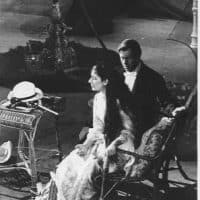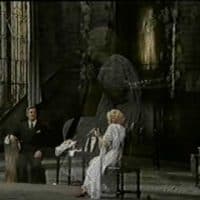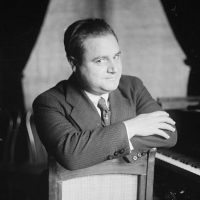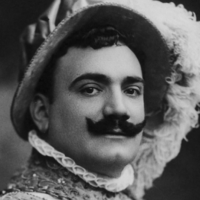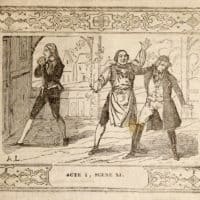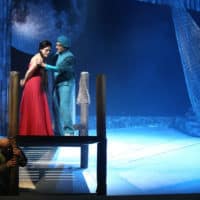
1o great composer induces passion the way Richard Wagner does. Knowledgeable opera goers seem to be divided into warring camps, vigorously campaigning for and against the art of the egomaniac of Bayreuth. In 50 years of opera going I have endured harangues beyond number intended to convince reluctant audiences that Wagner’s music is great and that they should surrender to its greatness. It’s the castor oil approach to art. It may taste bad, but it’s good for you. Or as Mark Twain (Bill Nye might have said it first) said, “Wagner’s music is better than it sounds.” Nobody finds it necessary to proselytize for Mozart or Verdi. This incredible bipolar reaction to Wagner is the subject of this article.
No one can seriously dispute Wagner’s exalted place in the history of Western art or his genius. Here Verdi has the definitive word. When asked by a young composer how to deal with hostile critics, Verdi advised ignoring them. “Look to the box office,” he said. “The theater is meant to be full.” Verdi’s dictum holds true for all art. The box office, of course, has to be looked at in the long term. In the short haul it is often irrational, like the stock market, but eventually it sorts everything out. The box office has spoken about Wagner. There is a large audience that eagerly wants to hear his music and which values him as much, or even more, than any other composer of operas. But this large audience seems to include only about half of the serious lovers of opera.
The anecdote is deadly in science. In art it may be quite telling – so here are a few. I have a daughter who literally has been listening to opera since before she was born. She attended her first staged performance of an opera at the age of five. She holds degrees from two of America’s elite institutions of higher learning. She makes her living writing for one of the country’s major newspapers.
“Dad, c’mon and visit me next month. We’ll go to the opera – anything but Wagner.”
“I can’t get anybody in the family to go to Wagner with me,” lamented my first cousin as we were eating Chinese food across from Lincoln Center. In a family of opera lovers she’s the only Wagnerian.
“I hope you get the Wagner gene from your mother or that it’s a mutant,” was my response. She’s my father’s brother’s daughter. “I’d hate to think that it might be lurking in my DNA waiting to pounce on an unborn descendant.”
“First this guy gets up and carries on for half an hour. Then this other guy responds for another half an hour. Not a tune to be heard. The audience acts like they’re in church. I just don’t get it.”
This is the description given me by my former teacher of his first and only visit to Bayreuth. He was dragged there by a German colleague. He is both the only authentic genius and great man I have ever personally known. He is also a polymath and the most erudite man I know. He will travel thousands of miles to hear a good performance of one of the Da Ponte/Mozart operas, but he’s never going back to Wagner.
“I can only handle one Ring Cycle a year.”
This was the response of another of the great man’s former students. I had asked him how many Ring Cycles he was going to that year. He meant that the experience so moved him that he couldn’t work to full capacity if he allowed himself more than one a year. He is a great scientist who has been elected to the National Academy of Sciences and whose friendship I severely test whenever I make a joke about Wagner.
“What racism? I know every word of the text and there’s no racism in it.”
This was the response of another scientist friend – also in the National Academy of Sciences – to my comment that Sachs final monologue in Die Meistersinger was a racist harangue. Well, make up you own mind. Here’s part of the English translation that accompanies Karajan’s recording of the opera, with Theo Adam as Sachs:
Beware! Evil tricks threaten us: –
if the German people and kingdom should
one day decay under a false, foreign rule
soon no prince will understand his people any more
and foreign mists with foreign vanities
they will plant in our German land;
what is German and true no one would know any more,
if it did not live in the honour of the German Masters.
This is what Denis Forman, a Wagner partisan to the point of madness, says about the passage in his commentary on the opera in his book The Good Opera Guide. “Even the racial propaganda mentioned in the notes above can be played down to zero effect except for the unavoidable and disagreeable final outburst about the ethnic cleansing of the arts.” The last scene of Die Meistersinger always reminds me of another Nuremberg Rally.
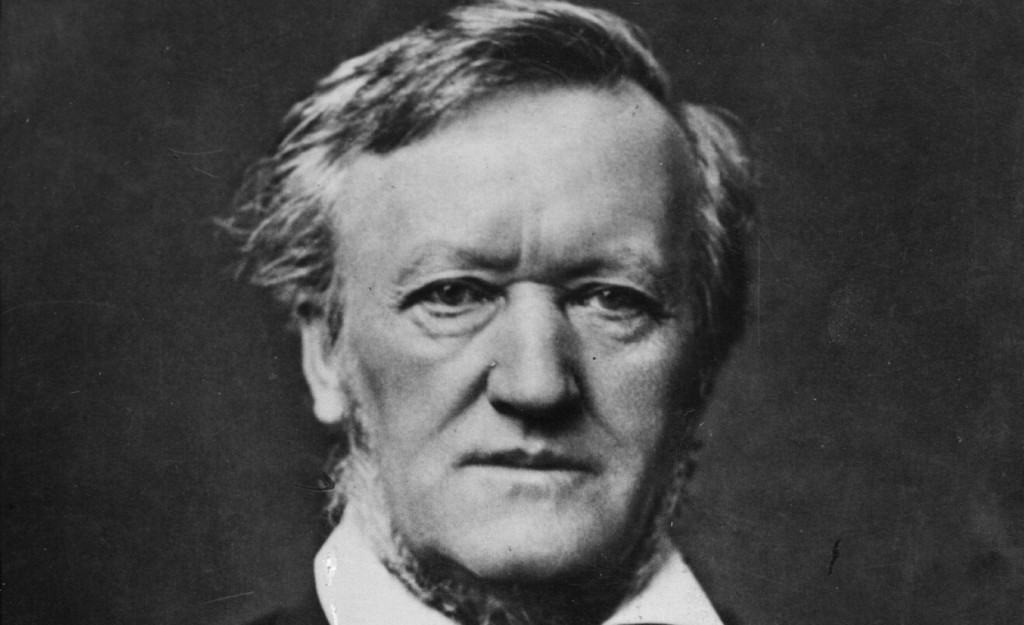
This brings us to a major problem. The composer was a monster. Of all the major figures associated with Nazism, no one did more to prepare the cultural soil of Germany for Hitler than did Wagner. Wagnerians of good will deal with this problem in two ways. They may simply deny it like my friend who knows the libretto of Die Meistersinger by heart, but who doesn’t seem to understand it. Or more commonly, they will say that the work must be separated from the man. An evil man who produced works of genius.
Let’s carry this line to its logical end. Suppose Hitler had been a painter of genius rather than a hack. After all, Churchill was a great writer – the winner of the Nobel Prize for literature. Would we be having Hitler retrospectives at the MOMA or the National Gallery? After all, you have to separate the work from the man. The question answers itself. You can’t completely separate the man from his work. So strike one is that your favorite (or least favorite) composer is a repulsive racist egomaniac (read any standard biography for the nauseating details) who was a musical genius but whose bad qualities as a human being could not always be separated from his work.
Strike two is the librettos. They were written by a writer who was as bad at writing as Wagner was good at composing. God, that eternal jokester, sent us Giuseppe Verdi the same year he produced Richard Wagner. The former determined to bend audiences to his will, the latter equally determined to please them. Thus, no Piave or Boito for Wagner. They might have imparted some good sense regarding stagecraft or timing to the self-obsessed German. A Wagner opera is a succession of highlights interspersed with long boring spells which could have been avoided if Wagner’s librettist had owned and used a scissors.
Die Meistersinger excepted (and it’s full of nastiness), there’s the odor of decay about Wagner’s operas. This feeling of decline and sickness culminates in Parsifal which makes even Tristan und Isolde an ad for mental health. Wagner’s self-conscious obsession with death, magic, and metaphor is doubtless what made him so distasteful to Isaiah Berlin. Berlin’s great essay, “The ‘Naïveté’ of Verdi” (1968), succinctly outlines the objections to Wagner (though he hardly mentions him by name) while concentrating on what was right with Verdi. But it’s hard to ignore Sir Isaiah’s “the appalling elephantiasis of late German romanticism” (who was the biggest elephant of them all?) or “Verdi’s assured place in the high canon of musical art, which nobody now disputes, is a symptom of sanity in our time.” What is a symptom of insanity?
Berlioz’s aesthetic objections to Wagner are discussed at length in David Cairn’s second volume of his magisterial biography of Berlioz (Chapter 26 Wagner). Wagner thought The Trojans a “nameless absurdity”. Berlioz, in turn, warned Pauline Viardot when he returned her vocal scores of The Flying Dutchman “to take care that the diminished sevenths didn’t escape and gnaw her furniture.” He vigorously objected to the frequency of dissonance in Wagner’s music.
“Berlioz believed in the future of music, not in the Music of the Future”, writes Cairns.
His (Berlioz) denigration of Wagner in a critical review in the Debats in 1860 likely contributed more than anything else to the Frenchman’s dismissal as a second rate composer, a status that lasted for a century after his death. He had gone from enfant terrible to old fart in an instant. Anyone who objected to Wagner could not be taken seriously by the intellectual elite of the late 19th and early 20th centuries, which was besotted by both the music and the lunatic prose of the German. This elite, of course, dismissed Verdi as a popularizer of no import. Verdi was still not completely intellectually respectable (Otello and Falstaff aside) when I first started going to the opera – at least by the vestiges of an elite which had accorded Wagner an extra-musical status in Western thought.
Stravinsky was harder to dismiss, so he was more or less ignored when he spoke of “the poison of music drama” or wrote about his one and only trip to Bayreuth: “The very atmosphere of the theater, its design and its setting, seemed lugubrious…The order to devote oneself to contemplation was given by a blast of trumpets. I sat humble and motionless, but at the end of a quarter of an hour I could not bear any more. My limbs were numb and I had to change my position. Crack! Now I had done it. My chair had made a noise which drew down on me the furious scowls of a hundred pairs of eyes…At last the ‘pause’ arrived and I was rewarded by two sausages and a glass of beer. But hardly had I time to light a cigarette when the trumpet blast sounded again, demanding another period of contemplation.” (Quoted in BBC Music Jan 2004).
Strike three is that much of the interest in Wagner is historical. He was, as mentioned above, the dominant figure in the intellectual life of the West in the second half of the 19th century. That’s ancient and unimportant information to someone who wants to see a good opera and doesn’t give a fig about hot house philosophy. Verdi again: There are only two kinds of music – good and bad. The most succinct and effective reduction of aesthetics I know of.
Wagner’s effect on fat heads 150 years ago accounts for the number of hits you get when you put his name into Google, about 2.2 million. That’s more than Abraham Lincoln gets. Verdi gets one third the number of citations as Wagner, but when you look at the number of performances each composer has had at the Met a very different relationship emerges.
By the middle of 2002 the Met had mounted 4915 performances of Verdi’s works. Wagner had been played 3468 times. Aida had been staged 1051 times, Lohengrin 612. Both Rigoletto and La Traviata have had more performances than Lohengrin. And the gap widens every season. This is the audience making the definitive critical judgment. I suspect the numbers would be similar at any major opera company, outside of Bayreuth. Wagner, who considered Verdi beneath notice, would doubtless be surprised to find the Italian described as opera’s Shakespeare by the music critic of the New Yorker (Alex Ross) during the centennial commemorations of Verdi’s death. In view of the critical reassessment of Puccini now underway (see Julian Budden’s Puccini – His Life and Work 2002), note that he too has passed Wagner in frequency of performance at the Met.
The Verdi year was the most impressive memorial year in my experience. More than 400 Verdi productions were presented around the world. No other musical anniversary in my memory brought out the display of affection that the Verdi commemoration evoked. The centennial of Wagner’s death in 1983 was muted in comparison. 2013 will be most interesting. The bicentennial of both the operatic titans of the 19th century will allow a critical assessment of both composers far enough removed from the rhetoric that clouded their positions in the musical world when their work was still connected to living memory.
It’s hard to write about Wagner without making fun of him and those devoted to him – so I won’t try. For God’s sake, his bust is in the bathrooms at Bayreuth – even Swift couldn’t top that. So I’ve decided to apply my experience as a scientist to the Wagner problem.
I propose that there is a gene for Wagnerism and that it is an autosomal dominant gene. Autosomal means it is not on an X or Y chromosome and thus is just as likely to affect either sex. Dominant means that only one copy of the gene is needed for it to express itself. This lets me off the hook concerning my unborn descendants. I can’t have the gene as it would have manifested itself by now. It also means argument is futile. If you lack the gene Wagner will seem like a lot of noise. If you have it you’ll seek leitmotifs like a moth to a flame. Your enthusiasm for diminished sevenths will verge on obsession.
Here’s where genetic counseling is crucial, both for those who are Wagner positive as well as negative. If you are negative and acquire a positive spouse your children have a 50% chance turning out Wagnerian. And if that isn’t bad enough your spouse will either drag you to Parsifal at the drop of a grace note or worse disappear for weeks on end in search of the perfect Ring Cycle. Things are not so rosy for someone Wagner positive either. Most people don’t realize that two copies of the Wagner gene are lethal. Thus, one Wagnerian should never marry another – 25% of their progeny would be doomed. Consult Gregor Mendel and his sweet peas if this is passing you by. Father Owen Lee, the noted lecturer and writer on opera and a devoted Wagnerian, has taken the safest path – celibacy.
This genetic explanation means there is no point in argument. You can’t argue a man into changing the color of his eyes. Similarly, you can’t reason an opera goer into or out of Wagner. It’s all in the genes. A warning label should be placed on Wagner, however – “Warning! Prolonged exposure can be dangerous to your health.” Denis Forman, mentioned above, has listened to a lot of Wagner. He openly admits to thinking Wagner the greatest of opera composers. All this listening to Wagner seems to have driven him a little daft. He has convinced himself that Wagner died heroically at Bayreuth. (It’s hard to believe that anyone writing a book on opera doesn’t know Wagner died in Venice.) He thinks Falstaff lacking both in heart and sex appeal. He also doesn’t seem to think much of Bach’s B minor Mass. So Wagnerians take care. You have been warned.
Finally, if you don’t like Wagner don’t be intimated by gene carrying Wagnerians into pretending you love leitmotifs. And if Wagner is your passion the rest of us realize you can’t help yourself.
